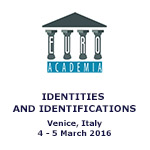Euroacademia Conferences
 Europe Inside-Out: Europe and Europeanness Exposed to Plural Observers (9th Edition) April 24 - 25, 2020
Europe Inside-Out: Europe and Europeanness Exposed to Plural Observers (9th Edition) April 24 - 25, 2020 Identities and Identifications: Politicized Uses of Collective Identities (9th Edition) June 12 - 13, 2020
Identities and Identifications: Politicized Uses of Collective Identities (9th Edition) June 12 - 13, 2020 8th Forum of Critical Studies: Asking Big Questions Again January 24 - 25, 2020
8th Forum of Critical Studies: Asking Big Questions Again January 24 - 25, 2020 Re-Inventing Eastern Europe (7th Edition) December 13 - 14, 2019
Re-Inventing Eastern Europe (7th Edition) December 13 - 14, 2019 The European Union and the Politicization of Europe (8th Edition) October 25 - 26, 2019
The European Union and the Politicization of Europe (8th Edition) October 25 - 26, 2019 Identities and Identifications: Politicized Uses of Collective Identities (8th Edition) June 28 - 29, 2019
Identities and Identifications: Politicized Uses of Collective Identities (8th Edition) June 28 - 29, 2019 The European Union and the Politicization of Europe (7th Edition) January 25 - 26, 2019
The European Union and the Politicization of Europe (7th Edition) January 25 - 26, 2019 7th Forum of Critical Studies: Asking Big Questions Again November 23 - 24, 2018
7th Forum of Critical Studies: Asking Big Questions Again November 23 - 24, 2018 Europe Inside-Out: Europe and Europeanness Exposed to Plural Observers (8th Edition) September 28 - 30, 2018
Europe Inside-Out: Europe and Europeanness Exposed to Plural Observers (8th Edition) September 28 - 30, 2018 Identities and Identifications: Politicized Uses of Collective Identities (7th Edition) June 14 - 15, 2018
Identities and Identifications: Politicized Uses of Collective Identities (7th Edition) June 14 - 15, 2018
Performing Identity or the Performativity of Situatedness
-
-

-
Presentation speakers
- Monika Jaeckel, Independent Artist Researcher, Berlin
- Download presentation
Abstract:
This presentation attempts to re-work the view on identity in relation to the impact institutionalizing terminology has on the ones of entangled human or non-human others. Considering institutions as cultural agreements my position takes its point of departure in acknowledging that materiality and culture – both including the ones of the body – are active and work on each other. Following D. Haraway’s interpretation of bodies as objects of knowledge, which establish their boundaries in intra-action, marks identities, also those of things and institutions, as changeable due to their specific situatedness. This re-turning of a unidirectional causal relationship between discourse and materiality renders theory as R. Coleman states, as inventive or in her interpretation of K. Barad, as performative. It marks the process of identity as deeply intertwined with the world’s becoming. Considering interpretation and as such meaning as arising in the entanglement of shifting inter-corporeality through material-discursive intra-action, is necessarily followed by a further shift questioning dual opposition. Its consequences mean to see subject and object, nature and culture, the individual, the social, and equally the symbolic as co-constituted in relation rather than being mediated through its ‘other’. What matters produces meaning as a coming together of inside and outside marking an intertwined experience, where exteriority never can be something absolute but emerges as a moment of opening and separation from intra-action as a specific situatedness. K. Barad’s Agential Realism provides an understanding of agency that is not a solitary power, but always intra-actively engaged in a mutual relationality of mattering with the surroundings defined as agential separability that never happens once and for all. These onto-epistemological practices open up towards a diffracted approach defining our apparatuses, like theory, as performative and the consequent phenomena, like identities, as approach- and changeable.
-
Related Presentations

Borders Objects: Dissolution or Exacerbation of Identity
- Sabine Du Crest













